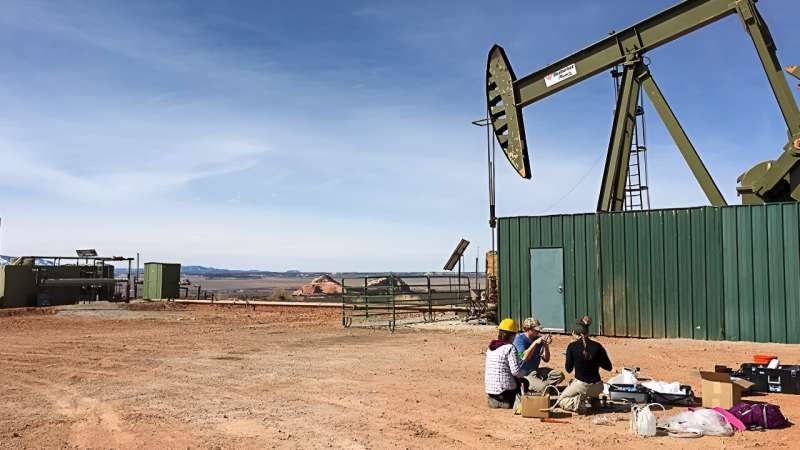 Researchers collect samples at deep wells, such as this oil well in Utah, to improve our understanding of geochemical cycles and microbial life beneath Earth’s surface. Credit: Jennifer McIntosh
Researchers collect samples at deep wells, such as this oil well in Utah, to improve our understanding of geochemical cycles and microbial life beneath Earth’s surface. Credit: Jennifer McIntosh
Much of Earth's water is hidden hundreds of meters beneath our feet, among soil particles and deep within rock pores and fractures.
Mining, oil and gas production, water wells, and other human activities involve extracting various fluids from or injecting them into the ground. Much attention has been paid to the toll these processes take on shallow groundwater and the water cycle. But less is known about how these activities affect the deep subsurface (500 meters to several kilometers deep), much of which was previously isolated for very long periods of geologic time.
In a new study in Earth's Future, Ferguson and colleagues illustrate how deep subsurface fluid flow rates associated with human activities such as oil and gas production most likely already exceed natural fluxes at these depths on a global scale. If such activities expand as expected, this rate will increase substantially, meaning anthropogenic fluid flow will likely leave a lasting imprint on the geologic record.
Much of this future expansion in human activity will be in the form of mining lithium from deep subsurface brines, producing geothermal energy, and attempting to capture and sequester carbon, all of which involves injecting large amounts of fluid deep underground.
The potential effects of dramatically increased fluid flux in the deep subsurface remain unclear. The subsurface has long been considered a valuable resource, but there is growing recognition of its connection to the larger Earth system.
One major consideration is the microbial communities living in these deep environments, some of which have coevolved with their rocky surroundings for tens of millions of years and which collectively account for an estimated 15% of Earth's total biomass.
In fact, deep microbes affect many industrial processes by altering the chemistry of oil and other products. Some companies deliberately inject substances that stimulate or suppress deep subsurface microbial activities to enhance the quality or quantity of their products.
The authors call for further research into how human activities perturb the deep subsurface because improved understanding could ultimately help minimize harmful effects.
More information: Grant Ferguson et al, Acceleration of Deep Subsurface Fluid Fluxes in the Anthropocene, Earth's Future (2024). DOI: 10.1029/2024EF004496
Provided by Eos
This story is republished courtesy of Eos, hosted by the American Geophysical Union. Read the original story here.
Citation: Anthropocene activities dramatically alter deep underground fluid flux, researchers find (2024, April 17) retrieved 17 April 2024 from https://phys.org/news/2024-04-anthropocene-deep-underground-fluid-flux.html
This document is subject to copyright. Apart from any fair dealing for the purpose of private study or research, no part may be reproduced without the written permission. The content is provided for information purposes only.


















 English (United States) ·
English (United States) ·